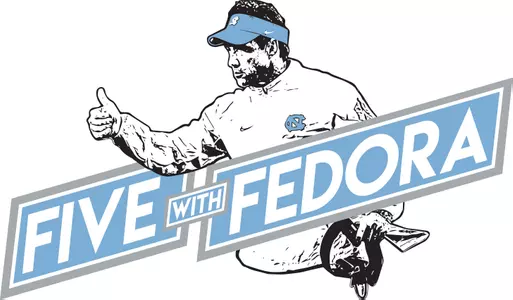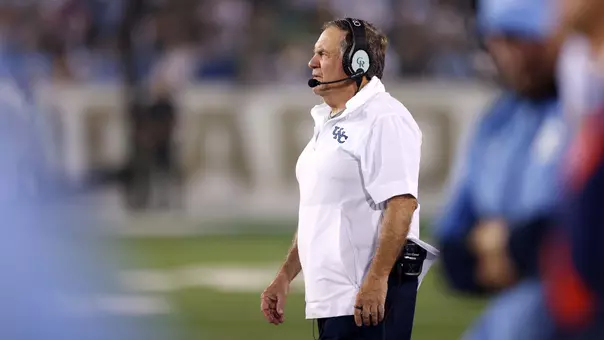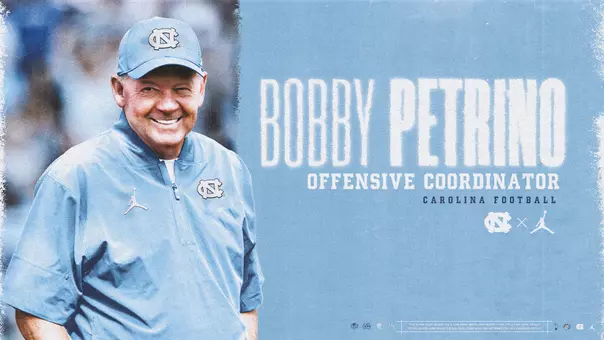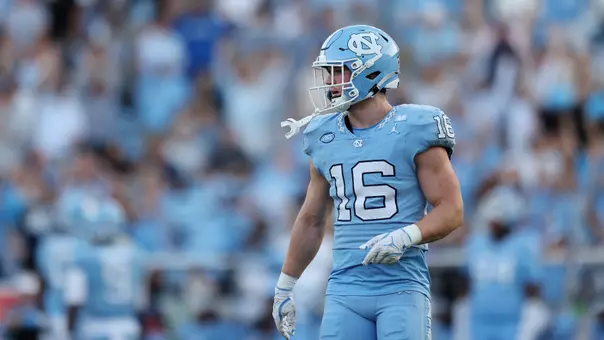University of North Carolina Athletics

Five With Fedora: Sept. 25
September 25, 2017 | Football
By Jeff Greenberg, GoHeels.com
1. Right after the game you referenced that as the game went on later in the second half you felt like Chazz Surratt started to try and make things happen instead of taking what they were giving him. What did the film show with that?
"For the most part it showed exactly that. In the earlier parts of the game I thought Chazz was poised and staying within the system and what he saw from the defense. But you could see him press some in the fourth quarter when we needed something to happen, which is why he ended up making the turnover. He was trying to make something out of nothing. That's when you can get into trouble. This was his third start of his career and there are going to be learning curve moments. You don't want them to happen in those crucial moments, but then again, there will be many more crucial moments for him in the future. So he will learn from this one and it will help him in the future. Another thing that was noticeable in the game though was how our personnel was looking at that point due to the injuries. Some of that probably affected his thinking too as we had to change what we had to call based on the adversity we were faced with at the time. I mean, we had guys out there having to play positions they hadn't even practiced, and I know Chazz knew that too."
2. You mentioned that moving forward from this game you needed to find a way to get this team over the hump in the fourth quarter to finish the game. After reviewing this game what are some of the things you think will go into that?
"First, it starts with making sure the mentality is there. We talk about it every week, but we as coaches need to reinforce the point that it's not just a physical thing that gets you there. Both teams are tired in the fourth quarter. And our guys will always be in the right position from a conditioning standpoint. What needs to happen moving forward is for them to control the mental side of it. You gotta give that much more at that point in the game. We need every single guy on the field to give more to finish the game. Second, that's the point in the game where we need guys to step up and make a play. That's the moment we need a game-changing play from somebody. In this game we had critical situations with third downs and the fourth down in the fourth quarter. We need guys to have the mentality that they're going to be the guy that steps up and make that critical play for us to win the game. So my job again will be to find what we need to do to get the guys focused on being the one that steps up and make the play to win the game."
3. On the flip side of this equation is making sure the guys don't lose sight of what they're doing well to put themselves in position to win the game. How do you balance that dynamic of focusing on what needs to change without forgetting what's working?
"That's the key right there. It's reminding them that we don't have to change what we're doing as much as we have to change how we're doing it for the full 60 minutes. Our guys battled hard to get to the point where we had the lead heading into the fourth quarter. There were good things that the guys did to get to that point. So you show them that on film and get them to see that when they just did their job and made the routine plays that good things happened. There are ups and downs throughout any game but the odds are in your favor when you continue to do what you've practiced and execute your job. Now yes, when there is a critical situation as I mentioned earlier, you have to rise up and make that play. And we had many opportunities to do that and didn't get it done. But you can't forget what got you that opportunity in the first place. You can't lose focus of who you are and what you do. When great effort, and our guys fought their tails off, and great execution meet, then odds are you're going to be the one that makes the plays needed to win more games."
4. What were the reasons you saw on film that prevented the offense from converting a higher percentage of third downs in this game?
"I think the main thing that hurt us there was the down and distance we kept putting ourselves in throughout the game. When we reviewed everything that stood out was the lost yardage plays on first down. Our inability to be effective on first down put us behind the chains and that's what hurt us most. We put ourselves into way too many third and long situations. If you convert about 28% of third and long situations then you're usually doing pretty well. But it's hard to win football games when you're giving yourself too many of those situations. We have to get better down and distance situations and move the chains. Moving the chains efficiently is what makes this offense go and that's how you get the defense on their heels. So I think in this game, it was more of our inability on first down to get anything going than it was not executing well on third down. Most of that stemmed from not being able to run the ball effectively. Our running game needs to be better. In this game what we saw wasn't a wholesale breakdown in execution. It was mostly one breakdown on each play. On offense you have to have all eleven guys execute their job. It only takes one breakdown to take the whole play down. We need to show the breakdown, coach to it and get it corrected."
5. Looking ahead to Georgia Tech, last year the defense had an effective game against the Yellow Jacket offense. Can you use that film to teach what to do this week or is too hard to match what a team does from one season to the next?
"No, you definitely watch it. What you're doing is looking for similarities in what they're doing so that your guys can get an idea of what they need to do in this game. There can be some recall that helps their eyes be in the right places and know that when they did that they were able to make plays. But you don't base your game plan on that. It's more to help teach and reinforce the fundamental techniques needed in a game like this one. They're going to have different personnel in different positions, but they're not going to be totally different in what they do on offense. They may run the plays in different ways with different schemes and looks. But the concepts are the same and so your concepts on defense are similar. It is useful to review with the players from that standpoint and then incorporate that knowledge into the game plan you build."
BONUS: We've heard a lot about how the amount of injuries this team is experiencing can affect what happens on the field. How does it affect you as the head coach on a personal level with the relationships you've built with these players beyond the field?
"You just really hurt for the kid. Plain and simple, it's hard. These guys aren't just players on your team. They're part of your family. You're a part of their lives and they're a part of yours every day. So you build strong relationships with them, but you also build those relationships with their families. During the whole process of recruiting you talk with them and their families about their dreams and what they want to do in football. The last thing you want for any of them is to see that dream delayed or end because of an injury. Put yourself in their situation. Imagine being a freshman again. It's your first time away from home. First time having to do something really hard, and playing college football is hard. Then you get hurt and you're spending your first 3-4 weeks of college working with doctors and rehabbing your injury. And you're doing that along with learning how to live on your own. Learning how to be a college student. Meeting people you've never met before because all of your lifelong friends are back home. It's a lot to handle at their age. Or what if the injury possibly ends their career here? You know how much they've invested in this and it's taken away from them for good. It's a rough thing to go through for anybody. But at the same time you have to be positive with them looking forward. You have to help them understand that this is another step in life. It's adversity that you have to overcome and doing so will make you a better man for it. You never know why it happens but there's a reason for it. One day they will encounter something later in life that's even tougher than this, but they'll be able to draw from this experience and be able to overcome it."
1. Right after the game you referenced that as the game went on later in the second half you felt like Chazz Surratt started to try and make things happen instead of taking what they were giving him. What did the film show with that?
"For the most part it showed exactly that. In the earlier parts of the game I thought Chazz was poised and staying within the system and what he saw from the defense. But you could see him press some in the fourth quarter when we needed something to happen, which is why he ended up making the turnover. He was trying to make something out of nothing. That's when you can get into trouble. This was his third start of his career and there are going to be learning curve moments. You don't want them to happen in those crucial moments, but then again, there will be many more crucial moments for him in the future. So he will learn from this one and it will help him in the future. Another thing that was noticeable in the game though was how our personnel was looking at that point due to the injuries. Some of that probably affected his thinking too as we had to change what we had to call based on the adversity we were faced with at the time. I mean, we had guys out there having to play positions they hadn't even practiced, and I know Chazz knew that too."
2. You mentioned that moving forward from this game you needed to find a way to get this team over the hump in the fourth quarter to finish the game. After reviewing this game what are some of the things you think will go into that?
"First, it starts with making sure the mentality is there. We talk about it every week, but we as coaches need to reinforce the point that it's not just a physical thing that gets you there. Both teams are tired in the fourth quarter. And our guys will always be in the right position from a conditioning standpoint. What needs to happen moving forward is for them to control the mental side of it. You gotta give that much more at that point in the game. We need every single guy on the field to give more to finish the game. Second, that's the point in the game where we need guys to step up and make a play. That's the moment we need a game-changing play from somebody. In this game we had critical situations with third downs and the fourth down in the fourth quarter. We need guys to have the mentality that they're going to be the guy that steps up and make that critical play for us to win the game. So my job again will be to find what we need to do to get the guys focused on being the one that steps up and make the play to win the game."
3. On the flip side of this equation is making sure the guys don't lose sight of what they're doing well to put themselves in position to win the game. How do you balance that dynamic of focusing on what needs to change without forgetting what's working?
"That's the key right there. It's reminding them that we don't have to change what we're doing as much as we have to change how we're doing it for the full 60 minutes. Our guys battled hard to get to the point where we had the lead heading into the fourth quarter. There were good things that the guys did to get to that point. So you show them that on film and get them to see that when they just did their job and made the routine plays that good things happened. There are ups and downs throughout any game but the odds are in your favor when you continue to do what you've practiced and execute your job. Now yes, when there is a critical situation as I mentioned earlier, you have to rise up and make that play. And we had many opportunities to do that and didn't get it done. But you can't forget what got you that opportunity in the first place. You can't lose focus of who you are and what you do. When great effort, and our guys fought their tails off, and great execution meet, then odds are you're going to be the one that makes the plays needed to win more games."
4. What were the reasons you saw on film that prevented the offense from converting a higher percentage of third downs in this game?
"I think the main thing that hurt us there was the down and distance we kept putting ourselves in throughout the game. When we reviewed everything that stood out was the lost yardage plays on first down. Our inability to be effective on first down put us behind the chains and that's what hurt us most. We put ourselves into way too many third and long situations. If you convert about 28% of third and long situations then you're usually doing pretty well. But it's hard to win football games when you're giving yourself too many of those situations. We have to get better down and distance situations and move the chains. Moving the chains efficiently is what makes this offense go and that's how you get the defense on their heels. So I think in this game, it was more of our inability on first down to get anything going than it was not executing well on third down. Most of that stemmed from not being able to run the ball effectively. Our running game needs to be better. In this game what we saw wasn't a wholesale breakdown in execution. It was mostly one breakdown on each play. On offense you have to have all eleven guys execute their job. It only takes one breakdown to take the whole play down. We need to show the breakdown, coach to it and get it corrected."
5. Looking ahead to Georgia Tech, last year the defense had an effective game against the Yellow Jacket offense. Can you use that film to teach what to do this week or is too hard to match what a team does from one season to the next?
"No, you definitely watch it. What you're doing is looking for similarities in what they're doing so that your guys can get an idea of what they need to do in this game. There can be some recall that helps their eyes be in the right places and know that when they did that they were able to make plays. But you don't base your game plan on that. It's more to help teach and reinforce the fundamental techniques needed in a game like this one. They're going to have different personnel in different positions, but they're not going to be totally different in what they do on offense. They may run the plays in different ways with different schemes and looks. But the concepts are the same and so your concepts on defense are similar. It is useful to review with the players from that standpoint and then incorporate that knowledge into the game plan you build."
BONUS: We've heard a lot about how the amount of injuries this team is experiencing can affect what happens on the field. How does it affect you as the head coach on a personal level with the relationships you've built with these players beyond the field?
"You just really hurt for the kid. Plain and simple, it's hard. These guys aren't just players on your team. They're part of your family. You're a part of their lives and they're a part of yours every day. So you build strong relationships with them, but you also build those relationships with their families. During the whole process of recruiting you talk with them and their families about their dreams and what they want to do in football. The last thing you want for any of them is to see that dream delayed or end because of an injury. Put yourself in their situation. Imagine being a freshman again. It's your first time away from home. First time having to do something really hard, and playing college football is hard. Then you get hurt and you're spending your first 3-4 weeks of college working with doctors and rehabbing your injury. And you're doing that along with learning how to live on your own. Learning how to be a college student. Meeting people you've never met before because all of your lifelong friends are back home. It's a lot to handle at their age. Or what if the injury possibly ends their career here? You know how much they've invested in this and it's taken away from them for good. It's a rough thing to go through for anybody. But at the same time you have to be positive with them looking forward. You have to help them understand that this is another step in life. It's adversity that you have to overcome and doing so will make you a better man for it. You never know why it happens but there's a reason for it. One day they will encounter something later in life that's even tougher than this, but they'll be able to draw from this experience and be able to overcome it."
Players Mentioned
WBB: Post-Miami Press Conference - Jan. 15, 2026
Friday, January 16
UNC Women's Basketball: Kelly's Career High Sends Heels Over Miami, 73-62
Friday, January 16
Checking In with Hubert Davis - January 13, 2026
Tuesday, January 13
WBB: Post-Notre Dame Press Conference - January 11, 2026
Sunday, January 11















